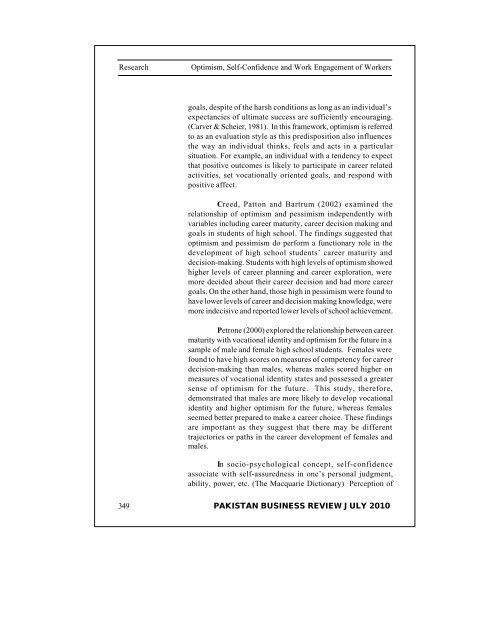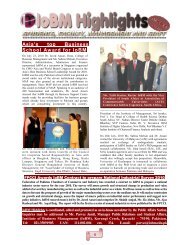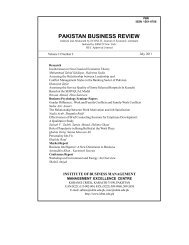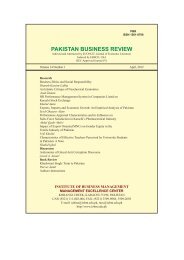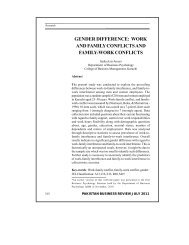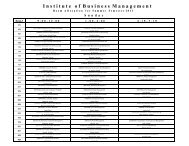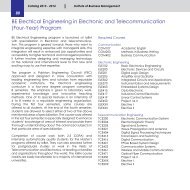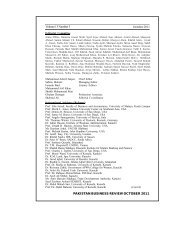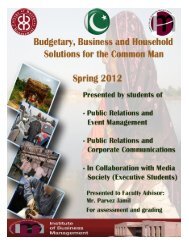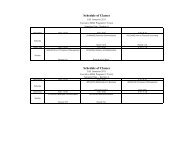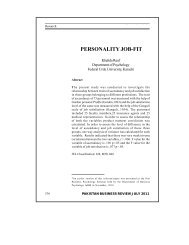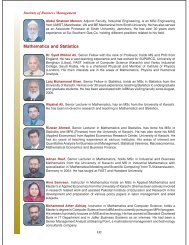Complete Volume - Institute of Business Management
Complete Volume - Institute of Business Management
Complete Volume - Institute of Business Management
You also want an ePaper? Increase the reach of your titles
YUMPU automatically turns print PDFs into web optimized ePapers that Google loves.
Research<br />
Optimism, Self-Confidence and Work Engagement <strong>of</strong> Workers<br />
goals, despite <strong>of</strong> the harsh conditions as long as an individual’s<br />
expectancies <strong>of</strong> ultimate success are sufficiently encouraging.<br />
(Carver & Scheier, 1981). In this framework, optimism is referred<br />
to as an evaluation style as this predisposition also influences<br />
the way an individual thinks, feels and acts in a particular<br />
situation. For example, an individual with a tendency to expect<br />
that positive outcomes is likely to participate in career related<br />
activities, set vocationally oriented goals, and respond with<br />
positive affect.<br />
Creed, Patton and Bartrum (2002) examined the<br />
relationship <strong>of</strong> optimism and pessimism independently with<br />
variables including career maturity, career decision making and<br />
goals in students <strong>of</strong> high school. The findings suggested that<br />
optimism and pessimism do perform a functionary role in the<br />
development <strong>of</strong> high school students’ career maturity and<br />
decision-making. Students with high levels <strong>of</strong> optimism showed<br />
higher levels <strong>of</strong> career planning and career exploration, were<br />
more decided about their career decision and had more career<br />
goals. On the other hand, those high in pessimism were found to<br />
have lower levels <strong>of</strong> career and decision making knowledge, were<br />
more indecisive and reported lower levels <strong>of</strong> school achievement.<br />
Petrone (2000) explored the relationship between career<br />
maturity with vocational identity and optimism for the future in a<br />
sample <strong>of</strong> male and female high school students. Females were<br />
found to have high scores on measures <strong>of</strong> competency for career<br />
decision-making than males, whereas males scored higher on<br />
measures <strong>of</strong> vocational identity states and possessed a greater<br />
sense <strong>of</strong> optimism for the future. This study, therefore,<br />
demonstrated that males are more likely to develop vocational<br />
identity and higher optimism for the future, whereas females<br />
seemed better prepared to make a career choice. These findings<br />
are important as they suggest that there may be different<br />
trajectories or paths in the career development <strong>of</strong> females and<br />
males.<br />
In socio-psychological concept, self-confidence<br />
associate with self-assuredness in one’s personal judgment,<br />
ability, power, etc. (The Macquarie Dictionary) Perception <strong>of</strong><br />
349<br />
PAKISTAN BUSINESS REVIEW JULY 2010


